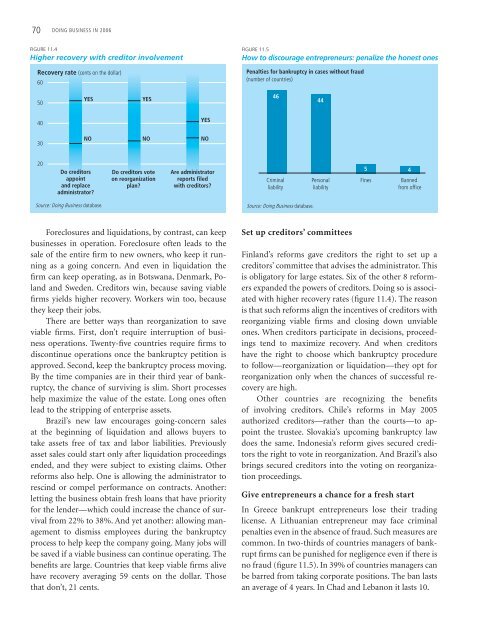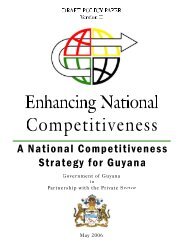Creating
Doing Business in 2006 -- Creating Jobs - Caribbean Elections
Doing Business in 2006 -- Creating Jobs - Caribbean Elections
You also want an ePaper? Increase the reach of your titles
YUMPU automatically turns print PDFs into web optimized ePapers that Google loves.
70 DOING BUSINESS IN 2006<br />
<br />
<br />
<br />
<br />
<br />
<br />
<br />
<br />
<br />
<br />
<br />
<br />
<br />
<br />
<br />
<br />
<br />
<br />
<br />
<br />
<br />
<br />
<br />
<br />
<br />
<br />
<br />
<br />
<br />
<br />
<br />
<br />
<br />
<br />
<br />
<br />
<br />
<br />
<br />
<br />
<br />
Foreclosures and liquidations, by contrast, can keep<br />
businesses in operation. Foreclosure often leads to the<br />
sale of the entire firm to new owners, who keep it running<br />
as a going concern. And even in liquidation the<br />
firm can keep operating, as in Botswana, Denmark, Poland<br />
and Sweden. Creditors win, because saving viable<br />
firms yields higher recovery. Workers win too, because<br />
they keep their jobs.<br />
There are better ways than reorganization to save<br />
viable firms. First, don’t require interruption of business<br />
operations. Twenty-five countries require firms to<br />
discontinue operations once the bankruptcy petition is<br />
approved. Second, keep the bankruptcy process moving.<br />
By the time companies are in their third year of bankruptcy,<br />
the chance of surviving is slim. Short processes<br />
help maximize the value of the estate. Long ones often<br />
lead to the stripping of enterprise assets.<br />
Brazil’s new law encourages going-concern sales<br />
at the beginning of liquidation and allows buyers to<br />
take assets free of tax and labor liabilities. Previously<br />
asset sales could start only after liquidation proceedings<br />
ended, and they were subject to existing claims. Other<br />
reforms also help. One is allowing the administrator to<br />
rescind or compel performance on contracts. Another:<br />
letting the business obtain fresh loans that have priority<br />
for the lender—which could increase the chance of survival<br />
from 22% to 38%. And yet another: allowing management<br />
to dismiss employees during the bankruptcy<br />
process to help keep the company going. Many jobs will<br />
be saved if a viable business can continue operating. The<br />
benefits are large. Countries that keep viable firms alive<br />
have recovery averaging 59 cents on the dollar. Those<br />
that don’t, 21 cents.<br />
Set up creditors’ committees<br />
Finland’s reforms gave creditors the right to set up a<br />
creditors’ committee that advises the administrator. This<br />
is obligatory for large estates. Six of the other 8 reformers<br />
expanded the powers of creditors. Doing so is associated<br />
with higher recovery rates (figure 11.4). The reason<br />
is that such reforms align the incentives of creditors with<br />
reorganizing viable firms and closing down unviable<br />
ones. When creditors participate in decisions, proceedings<br />
tend to maximize recovery. And when creditors<br />
have the right to choose which bankruptcy procedure<br />
to follow—reorganization or liquidation—they opt for<br />
reorganization only when the chances of successful recovery<br />
are high.<br />
Other countries are recognizing the benefits<br />
of involving creditors. Chile’s reforms in May 2005<br />
authorized creditors—rather than the courts—to appoint<br />
the trustee. Slovakia’s upcoming bankruptcy law<br />
does the same. Indonesia’s reform gives secured creditors<br />
the right to vote in reorganization. And Brazil’s also<br />
brings secured creditors into the voting on reorganization<br />
proceedings.<br />
Give entrepreneurs a chance for a fresh start<br />
In Greece bankrupt entrepreneurs lose their trading<br />
license. A Lithuanian entrepreneur may face criminal<br />
penalties even in the absence of fraud. Such measures are<br />
common. In two-thirds of countries managers of bankrupt<br />
firms can be punished for negligence even if there is<br />
no fraud (figure 11.5). In 39% of countries managers can<br />
be barred from taking corporate positions. The ban lasts<br />
an average of 4 years. In Chad and Lebanon it lasts 10.

















